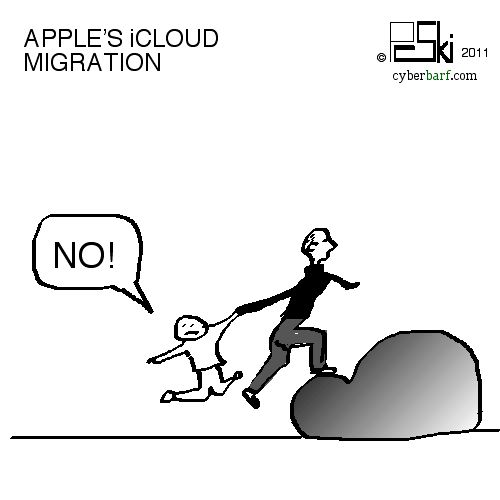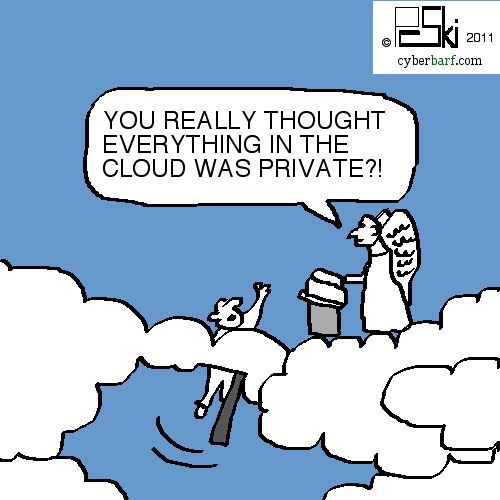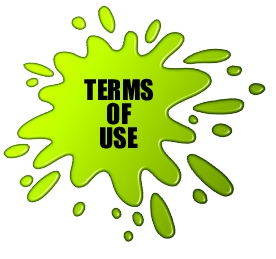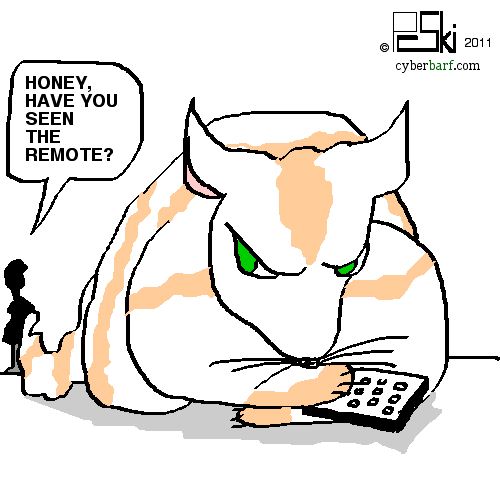cyberbarf
FORCED
MIGRATION ARTICLE
When
Steve Jobs took the stage at Apple's developer's conference, he confirmed
Apple's next great move: total integration of devices via iCloud.
Apparently, the new philosophy is that there is no longer a digital
personal hub, like a desktop or laptop computer. Everything is now
a device. The hub is going to be Apple's new huge data center in North
Carolina. Jobs was frustrated by the steps needed to synch one's devices
together: music from the iPod, pictures from the iPhone, contacts
from a MacBook. So he wants to force feed virtual synchronization
through the iCloud platform.

The
first reaction for attendees and Apple watchers was - - - what if
you don't want all your devices to synch together automatically? There
are some not named Tiger Woods who cringe if their spouse's iPhone
was auto-synched to their email message accounts. This push technology
in many respects is quite, pushy. Jobs is not offering Applephiles
an option to participate in the iCloud universe; he is taking everyone
by the hand and dragging them into the service since it will be the
core feature in the new computer and mobile operating systems, Lion
and iOS 5.

If
people had concerns about Big Brother reading all the stuff on one's
computer devices, what about Big Steve? He really did not address
the basic cloud issues of security, privacy, data reliability, storage
capacity or future pricing. No business is going to give away “free”
cloud storage services when the infrastructure cost is in the multi-million
to billion dollar range.
With
large corporations and government agency hacker attacks on the rise,
network security information especially from mobile devices should
be a real concern that should be addressed before a forced migration
of users to a vulnerable platform. Even Apple had to acknowledge recently
that its pristine anti-virus reputation was not infallible to malware
attacks, forcing new security updates.
But
what is the real reason for iCloud? Storing all your information in
a central location for synchronized access across any platform seems
to be an overkill solution for individual laziness. It is also a realignment
of conventional thinking that intellectual property is merely information
and data is merely a new commodity to be harvested, stored and resourced
like cards being shuffled in a deck.
We
still really don't know what the iCloud license agreement will really
say to individual users. How much access will third parties have to
your stored data? Will Apple or third parties take collective bits
of stored information and “secretly” data mine and sell
those results to spam marketers? Recently, Apple was called on the
carpet for collecting cell phone tower information from users to create
central data bases for its GPS mapping services. iPhone users were
not aware that their location information was being secretly collected
by Apple. Apple said no personal information was collected, just the
physical cell tower specifics in order to improve digital switching
as a person moves throughout different cell areas. It is this kind
of miscommunication on how the user experience (and information) can
lead to a great conflict.

Critics
will point to the NC data center as a huge hive of information, constantly
updated by iPhone worker drones (users) who will continually pollinate
it with personal information (creating the valuable honey data bases).
It may be a cynical perspective but the current non-manufacturing
business model in America is squeezing value out of inert data manipulation.
Apple
has been moving its products lines into the mobile crossroad. The
touch screen operating interface is now going to be put into new Lion
MacBooks. There will be resistance to it in the pure business community
where keyboards for word processing is still the most important feature
used on a daily basis. Apple has been pushing sales of new models
by not being backward compatible. A new OS makes the old OS obsolete
in certain respects. Software developers soon stop supporting the
old OS programs to concentrate on the new systems, with their new
feature sets. When you join the Apple bandwagon, you have to hold
on tight, because it is a fast ride.
With
iCloud, the bandwagon is being roped on a Saturn rocket. The ride
is going to be bumpy.
cyberbarf
DE-PANTSING
POLITICIANS COMMENTARY
It is apparent that there are a lot of strange people running
around Congress. Strange as in ego, narcissistic, arrogant and stupid.
Usually at the same time. Usually before and after getting caught
with their pants down.
For
the love of a wrong hash tag, a private message photograph gets into
the public domain.
Rep.
Anthony Weiner (Democrat, New York) is the latest politician caught
with his pants down, literally, in a sext scandal. Weiner first claimed
that his social network accounts were hacked by some unknown villain.
He then stated that someone used his account to send doctored or false
pictures of his underweared groin to co-eds across the country. In
less than ten days, he called an emergency press conference to say
he had lied, that he sent the compromising picture to the co-ed, and
that he had personal (and stressed legal) communications with women
over the internet. He said that he would not resign or take media
questions.
That
led to a Tiger Woods like media feeding frenzy. More women came out
of the wood work to say that Rep. Weiner had been sending them provocative
photographs, like the bare chested warrior pose that many late night
comics splattered across HD TV screens. Rep. Weiner, a former fixture
of a party attack dog on political TV and radio shows, went into hiding
and avoided the media. Weiner, a married man whose spouse is a senior
aide to Secretary of State Hillary Clinton, would be subject to various
calls for his resignation. Republicans caught up in sex scandals resign.
Democrats caught up in sex scandals hold teary eyed press conferences
and hold their ground against critics.
Then
conservative media site maven Andrew Breibart received the naked photograph
of Weiner's, well, wiener. So in short order, the image hit the Internet
Any vague suggestion that these were innocent chats turned into a
dark, pervy story. Just as another sexting story was about to break,
one which would allege Weiner had a relationship with a 17 year old,
Wiener made an announcement that he would go immediately “ into
counseling.”
For
a powerful politician to forcefully deny any story of sexting conduct
two weeks ago, to have to run and hide in a counseling center to avoid
legal or ethical investigations is becoming standard operating procedure
on Capitol Hill. In order to run for office, and the power, money
and perks that our the victors, one must cut loose all ties to morality
or shame. For the spoils of victory, said power, money and perks like
using one's office or title to Internet chat up young women, make
grown men into spoiled, hapless and stupid children.
Anything
digital sent to a social media web site can be copied, printed or
forwarded to any place in the world, including an editor of a news
organization. Politicians such as Wiener must truly believe that they
are above common sense because of their position as a representative
means things that apply to their constituents does not apply to them.
Like “cheating” on their spouse with graphic cyber-relationships
with other women.
And
how dumb was he? The biggest New York sports scandal in a decade was
the Brett Favre sexting scandal. Weiner cannot claim any ignorance
as to the consequences of his actions when his home state, with daily
screaming headlines in the New York tabloids, detailed Favre's misbehavior.
The public turned on the Jet quarterback faster than an unblocked
defensive end coming in for a brutal sack.
Weiner,
by all accounts, is such a pit bull that he will not give up his seat
in Congress. He is a career politician, no real experience in the
private sector. His sole being has been ranting about policy positions
by taking the higher moral ground against his opponents. If that is
the foundation for his political character, it has been crumbling
for weeks. He may have the mental outlook of a punk, cornered by his
own transgressions to turn him into a perv, but he can still represent
the folks in his district. His interests are allegedly aligned with
the votes cast on his behalf. How much embarrassment can his district
take before re-aligning themselves with a new representative? After
Wiener's counseling statement, several New York politicians began
to explore the possibility of unseating him in the next election.
You see, Wiener's self inflicted wounds make him a weak candidate,
and the wolves will be out to hunt him down. That's what career politicians
do: feast on each other's misfortunes for personal gain.
It
is a cycle of deceit that was uncovered by public publication of private
matters on social media sites. It is not a pretty picture what goes
on in the halls of D.C. or what is floating around the social networks.
cyberbarf
THE
AMAZON TAX ARTICLE
Various states have been attempting to have Amazon.com collect state
sales taxes on any sales generated by the Internet retail giant. Amazon
has fought back saying it will not collect or remit sales taxes for
state and local governments because it is burdensome on interstate
commerce. State and local governments are cash starved and they have
been looking to increase tax collections by any means possible to
cover massive budget short falls.
The
U.S. Supreme Court in the Quill decision held that a state
cannot impose a sales tax on a business unless that business had a
real “nexus” to the state in question. Nexus has been defined
as a physical presence in the state. The theory is that if you have
a physical presence in the state, that person or business is like
any other taxpayer receiving state and local governmental services.
In Texas, the state decided to impose collection taxes on Amazon because
it had warehouse facilities. In response, Amazon told the state that
it would leave the state, costing the area hundreds of jobs. Other
states have decided that Amazon affiliates, independent business operators
who direct clients to Amazon, are the physical presence nexus to impose
the sales tax collection on Amazon. Amazon said, no, we do not have
a physical presence in any other those states. But instead of risking
a decision in court, Amazon cut all ties to affiliates in those states.
The affiliates were outraged, not by Amazon, but by their own states
- - - many moving their homes and businesses out of state.
In
theory, states have been collecting “use” taxes on their
own citizens who bring in out-of-state products for which no in-state
sales tax was collected by the retailer. These use taxes are typically
forced upon property that needs to be titled, such as boats, airplanes
and automobiles. But the states define any property purchased by its
citizens fair game for state sales tax collection. Illinois has asked
its own citizens to calculate their own use taxes for all their annual
Internet purchases, to be filed with their annual income tax returns.
The Quill decision left open the question of whether use taxes
are permissible under the US Constitution.
The limits to the right of the public authority to
impose taxes are set by the power that is qualified to do so under
constitutional law. In a democratic system this power is the legislature,
not the executive or the judiciary. The constitutions of some countries
may allow the executive to impose temporary quasi-legislative measures
in time of emergency, however, and under certain circumstances the
executive may be given power to alter provisions within limits set
by the legislature. The legality of taxation has been asserted by
constitutional texts in many countries, including the United States,
France, Brazil, and Sweden. In Great Britain, which has no written
constitution, taxation is also a prerogative of the legislature.
Encyclopedia Britannica, 1999.
In
the United States Declaration of Independence, the rule "no
taxation without consent" laid down. Under this principle, the rights
of the tax administration and the corresponding obligations of the
taxpayer are to be specified in the law adopted by the people's representatives.
However,
there are limitations on the power of taxation by governments. Restraints
on the taxing power are generally imposed by tradition, custom, and
political considerations. Many countries have constitutional limitations.
Certain limitations on the taxing power of the legislature are self-evident.
As a practical matter, as well as a matter of (constitutional) law,
there must be a minimum connection between the subject of taxation
and the taxing power. The extent of income-tax jurisdiction, for example,
is essentially determined by two main criteria: the residence (or
nationality) of the taxpayer and his source of income. (The application
of both criteria together in cases where the taxpayer's residence
and his source of income are in different countries often results
in burdensome double taxation, although the problem can be avoided
or restricted by international treaties.) Encyclopedia
Britannica, 1999.
Taxes
other than income taxes--such as retail-sales taxes, turnover taxes,
death taxes, registration fees, and stamp duties--are imposed by the
authority (national or local) on whose territory the goods are delivered
or the taxable assets are located. Another self-evident limitation
on the taxing power of the public authority is that the same authority
cannot impose the same tax twice on the same person on the same ground.
A common limitation on the taxing power is the requirement that all
citizens be treated alike. This requirement is specified in the US
Constitution. A similar provision in of the constitutions is that
all citizens are equal and that no privileges can be granted in tax
matters. The rule is often violated through the influence of pressure
groups, however; it is also difficult to enforce and to interpret
unambiguously. In countries in which local governments are under the
control of the national government, a local tax can be nullified by
the central authority on the ground that it violates the national
constitution if it transgresses the rule of uniformity and equality
of taxpayers. Encyclopedia
Britannica, 1999.
The
United States Constitution is clear on taxation limitations. Article
IV deals, in part, with relations among the states and privileges
of the citizens of the states, The commerce clause (Article I, section
8) simply authorizes Congress “To regulate Commerce with foreign
Nations, and among the several States, and with the Indian Tribes.”
Since
Gibbons v. Ogden (1824), the US Supreme Court has broadly interpreted
Congress' regulatory power under the commerce clause as new methods
of interstate transportation and communication have come into use.
States may not regulate any aspect of interstate commerce that Congress
has preempted. However, at times, the courts do not view past precedent
and constitutional language in context with the framer's original
intent.
In
the US Constitution, Article I, Section 8 states:
“The
Congress shall have Power To lay and collect Taxes, Duties, Imposts
and Excises, to pay the Debts and provide for the common Defence and
general Welfare of the United States; but all Duties, Imposts and
Excises shall be uniform throughout the United States;
“To
regulate Commerce with foreign Nations, and among the several States,
and with the Indian Tribes.”
America
had just completed a revolution to break away from England. One of
the objectives of the revolution was to break the burdensome and penal
quality of taxation imposed upon the colonists, who had no right to
petition or object to the imposition of any tax by the crown. “Taxation
without representation” was a battle cry to the founding fathers.
But one must realize, that most of the founding fathers were wealthy
and successful merchants, farmers and businessmen. In certain respects,
there were on the front lines of harsh government taxation by the
King. They understood that heavy taxation took capital out of the
colonies and exported the means of independence and grown to the treasury
of the King and his parliament.
At
the time, sovereigns collected taxes on products such as imports.
These duties or stamp taxes were imposed by revenue collectors on
all merchants or suppliers as the ships docked in a port. The economic
engine of the world in the 1700s was global trade. Every barrel of
tea, wine or rum landing in Boston Harbor was taxed by the crown for
the privilege of bringing it ashore for resale or personal consumption.
This was an easy and efficient means of collecting taxes. So much
so, that the taxing authorities continued to increase the rate of
tax until the people had enough.
Just
as the various colonies had issues with England in regard to the taxation
of commerce and import fees, it was also an issue (or a potential
powder keg) between the colonies themselves. In the Confederation
of original States, there was animosity between the wealthy states
(such as Virginia) and the rural states in regard to free flow of
goods. A wealthy state could impose a tariff or tax on a rural state's
farm goods so as to penalize the import or protect their own merchant
farmers from competition. These border conflicts would be as ripe
as the American revolution over time. The founding fathers believed
that in order for their independence to be assured, all the new States
had to band together for their mutual protection against the European
superpowers of their time. As such, they put clear limitations on
interstate taxation in the final Constitution:
Article
I, Section 9 states:
“No
Tax or Duty shall be laid on Articles exported from any State.
“No
Preference shall be given by any Regulation of Commerce or Revenue
to the Ports of one State over those of another; nor shall Vessels
bound to, or from, one State, be obliged to enter, clear, or pay Duties
in another.”
This
constitutional provision clearly states that one state cannot tax
another state's goods from entering its borders. Likewise, a citizen
of one state would not be obligated to pay a tax in his home state
for purchases he made in another state. And in order to keep this
free commerce provision from loopholes, the following provisions were
adopted:
Article
I, Section 10 states:
“
No State shall, without the Consent of the Congress, lay any Imposts
or Duties on Imports or Exports, except what may be absolutely necessary
for executing it's inspection Laws: and the net Produce of all Duties
and Imposts, laid by any State on Imports or Exports, shall be for
the Use of the Treasury of the United States; and all such Laws shall
be subject to the Revision and Control of the Congress.”
This
meant that even if a State started collecting import duties and taxes,
all those moneys belonged to the federal government. The sole source
of revenue for the federal government was tariffs on international
goods. Clearly, the states did not have any room to craft interstate
commerce taxes.
And
if read in conjunction with other provisions, this ban on interstate
taxation applies to individuals.
Article
IV Section 2 clearly states: “The Citizens of each State shall
be entitled to all Privileges and Immunities of Citizens in the several
States. ”
The
9th Amendment states “The enumeration in the Constitution, of
certain rights, shall not be construed to deny or disparage others
retained by the people.”
The 10th Amendment states “The powers not delegated to the United
States by the Constitution, nor prohibited by it to the States, are
reserved to the States respectively, or to the people.”
If
you are a citizen of Virginia and purchased a cow in Maryland, which
imposed no sales tax on the transaction, Virginia could not penalize
or charge you a cow tax when you brought your cow back to Virginia.
That would be an improper tax on interstate commerce. It would also
be an infringement of a person's rights and privileges while conducting
business in Maryland where no sales tax for that transaction. The
prohibition of government interference with contracts was clearly
an issue the founding fathers thought paramount to establishing a
sound movement of goods and services between the new States. To allow
a state to tax any citizen, including their own residents, for out-of-state
purchases is clearly an unconstitutional burden on interstate commerce
when one reads the constitution as a whole, and in context.
























